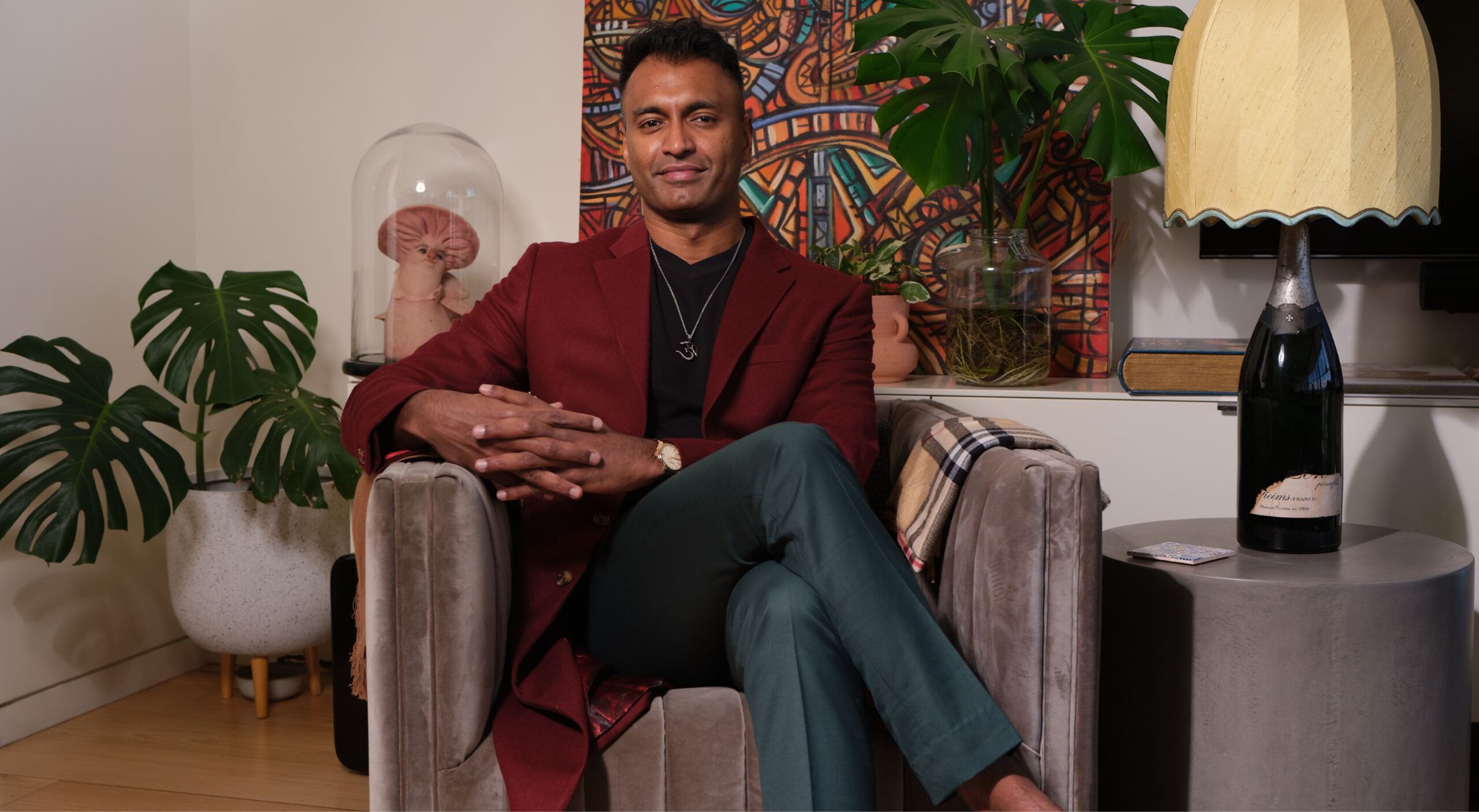After exiting his cryptocurrency empire with Caleb & Brown, Singapore-born doctor Prash Puspanathan is applying his unconventional approach to Australia’s emerging alternate therapy sector, redefining what it means to be a modern polymath
The Melbourne home of Dr. Prash Puspanathan tells a story before he even says a word. Indigenous art hangs alongside Indian textiles, Chinese antiquities neighbour contemporary pieces, and more than 65 works curated with the eye of someone who sees patterns others miss. It’s fitting, really, for a man who has spent his career connecting dots that shouldn’t logically connect.
At 40, this Singapore-born psychiatrist-turned-crypto-mogul has just orchestrated Australia’s biggest cryptocurrency acquisition with the exit of Caleb & Brown, the brokerage he co-founded in 2016. But don’t expect him to rest on his laurels. “I believe my greatest asset now lies in enabling others’ success,” he says, settling into his chair with the easy confidence of someone who’s mastered multiple games. “Serving as that central connecting point capable of translation, rather than needing to be the main man in the room.”
The journey to this moment began in Singapore’s rarified circles. A product of the Raffles system, Puspanathan wasn’t just another high-achieving student, he represented Singapore’s national under-19 cricket team whilst mastering Indian classical percussion on the side. Classic overachiever? Perhaps. But there’s a method to the apparent madness.
“Singapore shaped my bedrock,” he reflects. “That gave me intellectual discipline, existential safety and a deep respect for humanistic inquiry. I’m endlessly grateful for that foundation.” More importantly, it gave him something the crypto world desperately lacked: an understanding of how real wealth moves, and why trust trumps technology every time.
The path here was decidedly unconventional. Growing up in Singapore’s financial epicenter, Puspanathan had observed how private banking actually worked, from the personal relationships, to the bespoke service, and the institutional gravitas. When he looked at cryptocurrency markets years later, the gap was glaring.
A psychiatrist entering financial services raised eyebrows across both industries. “I had absolutely no business starting a brokerage,” he admits with directness. “I was deeply, ideologically involved in Bitcoin and started what was essentially a side hustle based on a gap that was so obvious.” That gap was trust, or rather, its absence. “In traditional banking, you have a banker and you have an investment manager, someone you trust. In crypto, there was none of that. So, perhaps it wasn’t surprising that a psychiatrist started what was fundamentally a people business.”

His psychological training proved unexpectedly valuable. Caleb & Brown grew into a recognised global brokerage, building credibility with both retail punters and institutional giants. But scaling a business in an emerging sector meant learning everything from scratch. “I had to teach myself everything: business, finance, managing large teams, and dealing with regulators,” he recounts. “I’ve grown a second shell I think, as a result of that process.”
Today, he operates across multiple worlds with the fluidity of a diplomatic polyglot. “I straddle multiple roles: clinician, researcher, investor, startup founder, exited founder, advisor to regulators,” he says. “It’s unconventional. But the ability to speak every stakeholder’s language, and be seen—both practically and ideologically—as one of them, creates genuine trust.”
The work remains purpose-driven, which distinguishes him from the typical crypto-rich crowd. “I’ve come to understand how fundamentally meaning drives my engagement,” he explains. “Wealth functions as potential energy, its value only emerges when converted into tangible work be it systemic change, cultural momentum, or measurable impact.”
This philosophy has drawn him back to medicine, specifically psychedelic-assisted therapy, operating strictly within Australia’s legal frameworks. He views it as the natural next frontier. “Cryptocurrency represented a technological revolution,” he notes. “I view psychedelics as equally transformative technology, enabling profound introspection and helping individuals extract insights and integrate them into sustainable behavioural change.”
The approach is clinical, not recreational. Puspanathan is helping develop Australia’s treatment protocols, working exclusively within regulated therapeutic systems. “The treatment architecture demands precision: rigorous preparation, carefully calibrated dosing, and structured integration,” he explains. “Without that scaffolding, the insight evaporates. If pharmaceuticals alone worked, Burning Man would be history’s most successful group therapy experiment.”
Industry scepticism doesn’t faze him—he’s heard it all before. “That challenge has followed me into every industry I’ve entered,” he shrugs. “People want quick fixes. But true transformation is terrifying. Nothing confronts us more directly than unfiltered self-encounter.”

Back in his art-filled living room, Puspanathan’s collecting philosophy mirrors his professional instincts. “There’s no singular stylistic thread,” he notes, gesturing at pieces that span continents and centuries. “I function as curator, not creator. My role is to design spaces where beauty can fully realise itself.”
It’s an approach that extends beyond aesthetics. “If meaning is the foundation of experience, then beauty is its highest accent,” he muses. “A painting isn’t just a surface, it reveals itself through layers, much like people do. The best art invites interrogation. Often, the questions are more valuable than the answers.”
Whether identifying structural gaps in cryptocurrency markets or developing frameworks for psychedelic medicine, Puspanathan’s methodology remains consistent: well-designed systems create more durable change than market enthusiasm alone. It’s a lesson learned in Singapore’s corridors of power, refined in crypto’s wild west, and now being applied to consciousness itself.






